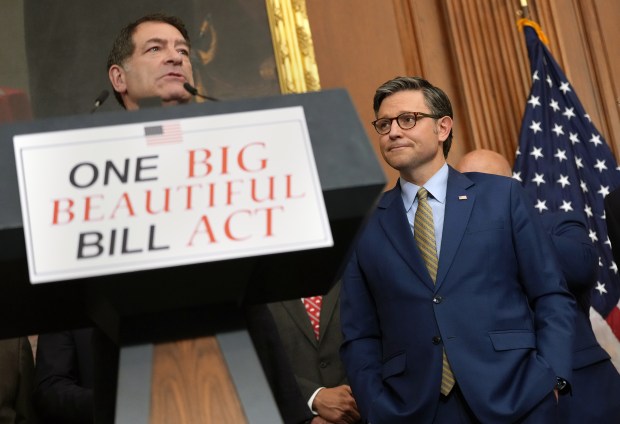Most Chicago homeowners will see their property tax bills rise significantly later this year — and that’s before any tax hikes by schools, the city or other local governments take effect.
Now that Chicago property reassessments are complete, residential taxpayers will shoulder 54% of the city’s property tax burden — up from 51% last year, Cook County Assessor Fritz Kaegi reported. That shift will take effect with second-installment bills this fall.
In the world of property taxes, taxing bodies get the amounts they levy regardless of who pays, and assessments determine how those charges are divided between homeowners and commercial properties. It’s a zero-sum game, replete with unhappy surprises.
Three percentage points may not sound like a lot, but for a total property tax tab in the billions, such changes are meaningful indeed. Based on last year’s property tax haul in Chicago by various governmental bodies, that shift in allocation alone will add about $250 million to the residential burden, the assessor’s office tells us.
Of course, this year’s total tax levy will be higher than last year’s, thanks to Chicago Public Schools. CPS consistently has raised property taxes by nearly $80 million annually — the highest increase it’s allowed under law — so about $43 million of that increase will fall to homeowners following the reassessments. That brings the collective increase for Chicago homeowners to more like $293 million.
Details on how much residential property tax bills in Chicago will rise aren’t yet available as we await the final tallies on governmental levies and other data inputs. But based on recent experience the increase for many will be painful.
Before we continue, we should explain why we’re discussing property taxes only in Chicago rather than all of Cook County. Every three years, the assessor revalues property in a portion of the county for tax purposes. This year, it’s the city of Chicago’s turn. Last year, it was the southern half of suburban Cook County. Next year, it will be the northern half.
These reassessments can result in substantial changes to tax bills. In the south suburbs, median residential property tax bills increased nearly 20% last year following the reassessment. That followed a 4-percentage-point shift of the total burden to residential taxpayers from commercial taxpayers, due to the 2023 reassessments.
The impact of Chicago’s 3-percentage-point shift is yet to be detailed; more precise estimates will be available this summer. But the south suburban experience suggests a median city increase in the low double digits.
Perhaps more comparable would be Chicago’s experience after the previous triennial reassessment, in 2021. For that tax year, due to rising levies and a slightly higher share of the overall burden, residential tax bills rose by $261 million, according to the assessor’s office. That led to an 8% increase in median tax bills for Chicago homeowners, according to a report at the time by the Cook County treasurer’s office.
So whether the median increase is as low as 8% or as high as 15%, it’s fair to project that the majority of Chicago homeowners will see substantial increases in their upcoming tax bills. And some surely will get eye-popping hikes, as was the case in the south suburbs.
Disparities will be seen neighborhood by neighborhood, too, thanks to differing property value increases in various parts of the city. Anecdotally, aggregate residential property values following the reassessment increased more in some low-income neighborhoods than in affluent areas such as the Gold Coast. That could lead to spikes in property tax bills in parts of the city populated by residents least able to absorb them and more muted increases — or even reductions — in neighborhoods where residents are better off.
Assessor Kaegi continues to point the finger of blame at the three-member Cook County Board of Review, which has the final say on property-owner appeals of the assessor’s work. The board cut Chicago commercial property assessments by $4.4 billion, or 17%, this year while trimming residential values by just $0.4 billion, or 1%, the assessor said in his May 20 news release.
Kaegi’s initial reassessments improbably would have boosted the commercial share of the tax load by 2 percentage points to 51%. The commercial share dropped to 46% after the Board of Review’s changes.
Members of the board — such as former Ald. George Cardenas, whose Board of Review district includes the Southwest Side and parts of the Northwest Side of Chicago — say they’re using property-specific data when considering appeals and that Kaegi’s more generalized methodology artificially inflated commercial values.
This page has questioned whether Kaegi’s office appropriately accounted for the brutal losses owners of downtown office buildings and retail properties suffered. But the continuing back-and-forth between the assessor and the board simply underscores that both agencies need in the future to work to forge a common methodology for assessing property values.
In the short term, the pain to come for Chicago homeowners should serve as a warning to taxing bodies, particularly the city of Chicago. Last year’s revolt on the City Council floor over Mayor Brandon Johnson’s proposed $300 million property tax increase likely will be but a prelude to a far rougher budget battle if the mayor attempts again to balance Chicago’s books on the backs of property taxpayers.
Imagine how much more intense the anger this coming autumn would be if Johnson had won approval for that $300 million hike. That would have added another $162 million or so to residential increases that are approaching $300 million as it stands. Last December, aldermen rejected even Johnson’s last-ditch attempt at a $68.5 million hike. They foresaw the dynamic we’re experiencing now.
So, even in the face of a $1 billion budget hole, hike property taxes at your political peril, Mayor Johnson and City Council members. And let this serve, too, as a warning to Chicago school board members, all of whom will be elected beginning in 2027. The relentless property tax hikes to finance a bloated public school system will get a harsher spotlight once all board members have to face voters.
Submit a letter, of no more than 400 words, to the editor here or email letters@chicagotribune.com.




